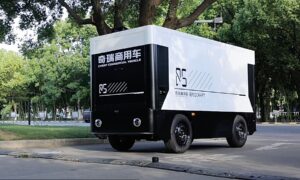Will Self-Driving Cars Reduce or Increase the Cost of Auto Insurance?
To better understand the potential impact of self-driving cars on auto insurance costs, we sought predictions from industry professionals, including Chief Operating Officers, Directors, and Business Development Managers. From reducing risk and manufacturer involvement to expecting car companies to assume responsibility, explore the nine insightful predictions these experts shared on the future of auto insurance in the era of self-driving cars.
- Reduced Risk and Manufacturer Involvement
- Initial Cost Increase for Features
- Complex Factors and Uncertain Predictions
- Safety, Repair Costs, and Liability Shifts
- Mixed Impact on Insurance Costs
- Brokers Must Stay Informed
- Lower Premiums With Self-Driving Cars
- Initial Increase, Eventual Decrease
- Car Companies Assume Responsibility
Reduced Risk and Manufacturer Involvement
Self-driving cars are like a dream come true for insurers. The laws requiring car insurance and minimum coverage are not likely to change. The real game-changer here is that the reduced risk associated with self-driving cars means fewer payouts for insurers.
And you know what that means? It’s a win for their profit margins. As a result, riders might get significant discounts on their insurance rates for having self-driving functionality.
But let’s be real here. For the next 30 years, only those fancy, expensive luxury vehicles will have this feature. So, you’ll still be shelling out a fortune to insure your self-driving car, making it more of a net-zero gain for you in the end.
That is why it is important for manufacturers to be involved in insurance. For example, subscription models like Care by Volvo, which encompass insurance coverage, will become the norm for autonomous vehicles. This approach will ensure that a single liability policy can cover the user, lessee, and manufacturer.
Paw Vej, Chief Operating Officer, Financer.com
Initial Cost Increase for Features
I believe that there will be an initial increase in the cost of auto insurance because of the sophisticated driver-help features. When I upgraded to a model with advanced autonomous functionality, I noticed my insurance premium ticked up a notch.
Despite the claim of reduced accidents with these high-tech systems, insurers are still getting a handle on the risk profile of this new technology.
The increase was because of the costly replacement and repair of the cutting-edge components involved. For now, we have to pay a premium until completely autonomous vehicles are developed.
Ben McInerney, Director, Go Tree Quotes
Complex Factors and Uncertain Predictions
The cost of auto insurance is heavily influenced by a variety of factors, and it’s likely that self-driving cars will only add to the complexity of this equation.
On one hand, self-driving cars are likely to be much safer than traditional cars, with figures from the World Health Organization estimating that 1.3 million people die in road crashes each year; the widespread adoption of self-driving cars could help reduce this number significantly by as much as 90%.
Insurance companies may need to cover a wider variety of issues than they do now, such as liability for companies responsible for software malfunctions and cyber-security breaches.
It’s likely that there will be both increases and decreases in certain areas, but until more data is available on the topic, it’s impossible to make a definitive prediction on how self-driving cars will affect the cost of auto insurance.
Joe Giranda, Director of Sales and Marketing, CFR Classic
Safety, Repair Costs, and Liability Shifts
The introduction of self-driving cars may affect auto insurance costs. Factors include improved safety, and potentially reducing accidents and claims.
Advanced technology in self-driving cars may initially increase repair costs but could decrease them. Liability may shift from drivers to manufacturers, potentially changing insurance models. Data from self-driving cars can inform personalized insurance pricing.
Overall, self-driving cars may lead to reduced auto insurance costs, but the extent depends on adoption rates, technological advancements, and legal considerations. These changes may also influence insurance coverage and risk landscape for auto repair shops.
Zeeshan Rashid, Digital Marketing Expert, Torque360
Mixed Impact on Insurance Costs
Introducing self-driving cars will have a mixed impact on auto insurance costs. While autonomous vehicles might reduce accidents caused by human error, leading to fewer claims and lower premiums, there are other factors to consider.
The complex technology in self-driving cars may initially lead to higher repair and replacement expenses in the event of an accident or system malfunction, and specialized training for repair technicians may also be required.
The overall impact on auto insurance costs will depend on the adoption rate of self-driving cars, their safety record, and the adjustments made by insurance providers to accommodate this emerging technology.
Close monitoring of self-driving car performance, safety, and policy adjustments will probably influence premiums. Insurance providers must adapt to the changing landscape and balance the potential reduction in accidents with the associated repair and maintenance costs.
Shane McEvoy, MD, Flycast Media
Brokers Must Stay Informed
The emergence of self-driving cars has captured the attention of insurance brokers, who are keenly interested in understanding the potential impact on auto insurance costs. While the exact outcome remains uncertain, it is crucial to examine the key factors at play.
However, it is essential to acknowledge that as self-driving technology continues to develop, there may be instances of technical failures or external factors leading to accidents. These scenarios could contribute to higher repair and replacement expenses, influencing insurance premiums.
To gain valuable insights and develop effective strategies in this ever-evolving landscape, insurance brokers are encouraged to consult industry experts or trusted sources. By staying up-to-date on industry developments, brokers can adapt their approaches and provide optimal insurance solutions to their clients.
Derrick Miler, Insurance Consultant, CHES Special Risk
Lower Premiums With Self-Driving Cars
Once self-driving cars become the norm, average premiums are likely to be lower than for standard vehicles driven by people.
Technology and AI do not have to worry about lack of concentration or other human-like concerns and simply rely on energy and precision-engineered software to operate. So, assuming self-driving cars have fewer accidents, there will inevitably be an impact on auto insurance premiums in the future.
While most experimental or prototype self-driving cars on the road are already safer than on-the-market, manually driven vehicles, their safety profile will inevitably improve over time as self-driving technology advances.
Alex Buttle, Founder, Motorway
Initial Increase, Eventual Decrease
I predict that self-driving cars will increase the cost of auto insurance for the vehicle in the beginning stages. The reason for this would be due to it being a newer vehicle and having new electronic software that society is not used to or has worked with before.
There is bound to be an accident involving the vehicle since other drivers will probably operate their own vehicles, and the self-driving vehicle may not avoid the accident. If it were to be involved in a crash, then it would be more costly to repair than the average vehicle since car parts would be more scarce and not easily accessible.
However, over time, if the vehicle’s performance has proven to be safe and capable of operating smoothly with little to no car accidents, and with more drivers having self-driving cars, then I believe that the insurance cost would eventually decrease to an extent but remain at a higher cost value than the average driver.
Alexis Karapiperis, Customer Service Rep/marketing Assistant, A Plus Insurance
Car Companies Assume Responsibility
It’s natural if you find it hard to believe that car companies will foot the bill for your insurance premiums in the event of an accident. However, the standard has been set.
In the event of an accident caused by a self-driving system, companies like Google, Volvo, and Mercedes-Benz have already agreed to take responsibility. As a bonus, Tesla is now offering insurance coverage to its customers. This offering shows unprecedented faith in the technology. 94% of all accidents can be attributed to avoidable human mistakes.
However, you shouldn’t expect a problem-free procedure. Experts agree that a great deal of litigation is likely to occur before any clear precedents are established and the situation calms down. Before automakers take complete responsibility for crashes, it may be necessary to install sophisticated tracking devices in vehicles to find out if a human or AI driver was at fault.
Sasha Quail, Business Development Manager, claims.co.uk
Related Questions



































